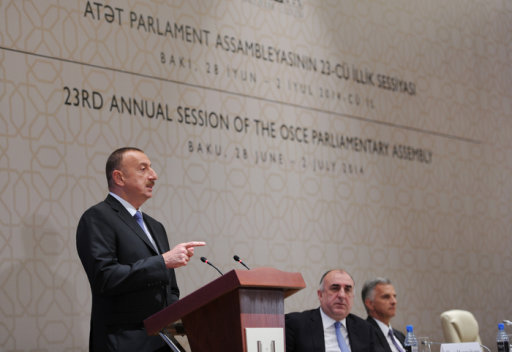Nagorno-Karabakh conflict major source of threats to region: Azerbaijani President

By Sara Rajabova
The Armenian-Azerbaijani Nagorno-Karabakh conflict, which is one of the main hindrances to development of the South Caucasus region, was widely discussed during the OSCE Parliamentary Assembly's 23rd annual session which kicked off in Baku on June 28 and will wrap up on July 2.
High-ranking officials discussed here the settlement process of the Nagorno-Karabakh conflict which emerged in 1988 after Armenia's territorial claims against Azerbaijan.
Azerbaijani President Ilham Aliyev called the Nagorno-Karabakh conflict a major source of threat to the region.
He stressed that the UN Security Council's four resolutions on immediate withdrawal of Armenian troops from Azerbaijani territories, as well as decisions and resolutions by OSCE, the European Parliament, Parliamentary Assembly of Council of Europe, Organization of Islamic Cooperation, Non-Alignment Movement and other organizations on the conflict have been ignored by Armenia.
"And the best way to reduce tensions and build confidence-building mechanisms will be the beginning of withdrawal of Armenian troops from the territories of Azerbaijan," President Aliyev said.
Touching upon the Nagorno-Karabakh conflict, OSCE Chairperson-in-Office, Swiss President and Foreign Minister, Didier Burkhalter said OSCE intends to continue the mediation.
The OSCE is the only organization, which engaged in the mediation activity on the negotiations over the peaceful settlement of the Nagorno-Karabakh conflict.
Peace talks, mediated by Russia, France and the U.S. through the OSCE Minsk Group, are underway on the basis of a peace outline proposed by the Minsk Group co-chairs and dubbed the Madrid Principles. However, the negotiations have been largely fruitless so far despite the efforts of the co-chair countries over 20 years.
Burkhalter highlighted the urgency of a new dialogue between the parties to the conflict
He said the next step will be organizing a meeting between the Azerbaijani and Armenian presidents, adding that it will be necessary to lay the groundwork for a new dialogue.
"A number of issues require clarification. A few weeks ago, we discussed this issue with both presidents," Burkhalter said.
Azerbaijani and Armenian Presidents last met on November 2013 and discussed the settlement process of the Nagorno-Karabakh conflict.
The double standards by the international community towards the Nagorno-Karabakh were also a matter of discussions during the OSCE PA session.
Azerbaijani Parliamentary Speaker Ogtay Asadov said Nagorno-Karabakh conflict occupies a special place among the conflicts in the South Caucasus, stressing that despite the numerous resolutions adopted on the conflicts, none of them have been implemented yet.
Asadov said the people of Azerbaijan expect more efforts in settling the conflict, noting that if these efforts are based on a common approach to all conflicts relating to the violation of the territorial integrity in the area of Europe, they will be more useful.
He said Armenia's violation of the Helsinki principles for more than 20 years remains unanswered by the international organizations, stressing the need to put an end to double standards in the organizations.
Referring to the principle of self-determination of the international law, Armenians try to establish their second state in the occupied territories of Azerbaijan. This plan of Armenians is baseless, as there is no precedent in the world on establishing two states by one nation.
Azerbaijan repeatedly stated that it can provide a high degree of autonomy to the Nagorno-Karabakh within its territorial integrity, but the Armenian side rejected it.
Responding to provocative statements by Armenian MP at the OSCE PA session on June 29, Azerbaijani Parliamentary Deputy Speaker Bahar Muradova said the population in Azerbaijan's occupied territories live in poverty and are deprived of all opportunities.
"Our colleagues visiting Nagorno-Karabakh see the region's condition, and observe the condition of very poor population who are living on low standards, devoid of all the opportunities," Muradova said.
She noted that there is no such a notion like the "people of Nagorno-Karabakh". Only Armenians live in Azerbaijan's occupied territories, after the invasion of Nagorno-Karabakh region and adjacent territories of Azerbaijan.
Muradova said Azerbaijan is very concerned over current state of Armenians living in the occupied territories, as they have become the hostage of the idea of "Great Armenia".
She also noted that Armenians do not want to hear truth about Nagorno-Karabakh, and said the city of Yerevan is also a historical Azerbaijani land.
"We will never allow creating a second Armenian state on Azerbaijani lands. And let all know this," Muradova added.
Speaking at sidelines of the OSCE PA session, Minister for EU Affairs of Turkey, Mevlut Cavusoglu criticized the OSCE Minsk group.
"OSCE Minsk Group did not make any serious efforts to resolve the Nagorno-Karabakh conflict. With greater involvement of the United States and Russia, the conflict would have been completed," Cavusoglu said.
Before, the Azerbaijani official and several foreign politicians also criticized the OSCE Minsk Group's mediation efforts.
Cavusoglu said, as a result of the conflict, many women and children have become refugees, noting that the conflict should be resolved as soon as possible.
Armenia occupied over 20 percent of Azerbaijan's internationally recognized territory, including Nagorno-Karabakh and seven adjacent regions, after laying territorial claims against its South Caucasus neighbor that caused a brutal war in the early 1990s.
As a result of the military aggression of Armenia, over 20,000 Azerbaijanis were killed, 4,866 are reported missing and almost 100,000 were injured, and 50,000 were disabled.
The UN Security Council has passed four resolutions on Armenian withdrawal from the Azerbaijani territory, but they have not been enforced to this day.
Here we are to serve you with news right now. It does not cost much, but worth your attention.
Choose to support open, independent, quality journalism and subscribe on a monthly basis.
By subscribing to our online newspaper, you can have full digital access to all news, analysis, and much more.
You can also follow AzerNEWS on Twitter @AzerNewsAz or Facebook @AzerNewsNewspaper
Thank you!
